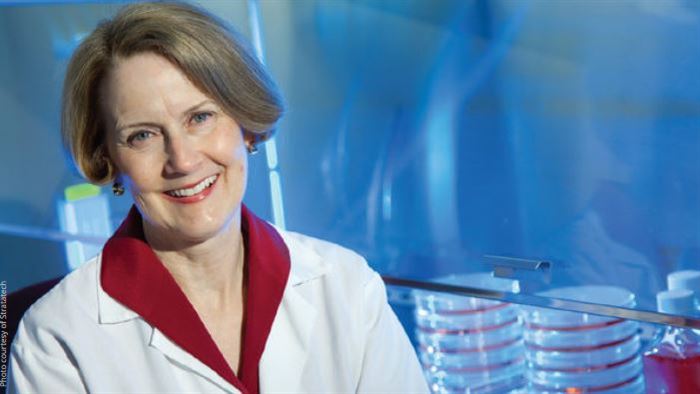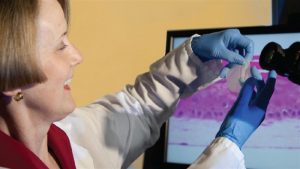7.20.17 | Madison Magazine | Maggie Ginsberg

B. Lynn Allen-Hoffmann was already growing human skin in an organotypic culture when she met the burn doctor who would change everything. The department of pathology and laboratory medicine faculty researcher and professor had been at UW–Madison 15 years when she made the serendipitous discovery that would ultimately lead to Stratatech, the Madison-based skin regeneration company she founded in 2000. In the last three years alone, Stratatech snagged a prestigious Tibbets Award; landed a five-year, $247 million federal government contract; and was acquired by publicly-traded Mallinckrodt Pharmaceuticals for an undisclosed sum.
“I worked on these cells for several years, not realizing their full potential,” says Allen-Hoffmann of StrataGraft, a regenerative skin tissue that mimics natural skin with compelling potential for burn victims. Although Allen-Hoffmann built her career based on her “passion” for skin and she’d “always been patient-centric,” it was a single conversation that “forever changed the focus of [her] professional efforts.” She visited the regional burn center at University of Wisconsin School of Medicine and Public Health, one of 129 verified burn centers nationwide, where a thrilled burn unit nurse connected her with the center director.
“I gave him a big biochemical download on the work we’d done on these cells and he looked at me and he said, ‘You don’t know what I need,’” she says, smiling. “And he was right, I didn’t. But he did invite-slash-challenge me to watch him do a burn surgery, and that resulted in what I call my epiphany day.”

For eight and a half hours one fateful morning, Allen-Hoffmann watched the skilled surgical director graft skin onto a young Wisconsin farmer who’d suffered third-degree burns over 95 percent of his body. “This was an incredibly powerful personal experience for me,” she says. He’d already told Allen-Hoffmann about the limitations of autografting—the current standard of care in which healthy skin is cut from other parts of the body and transferred as a wound dressing to the burn area—including pain, infection, scarring, and limited availability of healthy skin. What he really needed were more tools to treat the approximately 30,000 Americans admitted to burn centers each year.
“I sat there thinking, what am I doing? If there was any way [these cells] could help individuals, that’s what I should be focused on,” recalls Allen-Hoffmann, adding that she also felt a responsibility as a UW–Madison faculty member to provide innovative technologies for people in need and alleviate suffering if she could—the core essence, she says, of the Wisconsin Idea.
“And that is exactly what I did.”
With the help of the Wisconsin Alumni Research Foundation, Allen-Hoffmann patented and licensed her cells and moved her lab into the only space available at University Research Park—a “storage closet” with running water and just enough room for a 4-foot hood. Now Stratatech’s team of about 60 works on a pipeline of products inside two URP buildings. Core product StrataGraft is now in phase three clinical trials for partial-thickness wounds at 11 clinical sites nationwide, including University Hospital. Mallinckrodt also has begun phase two trials assessing StrataGraft for full-thickness wounds. If approved by the U.S. Food and Drug Administration, all burn centers in the U.S. will have access to StrataGraft regenerative skin tissue, and Allen-Hoffmann’s personal mandate to use her work to help others will be fully realized.
“[UW–Madison] is a fabulous science community. It’s an open community, it has good communication, it has a history of being innovative,” says Allen-Hoffmann, who transferred her postdoctoral fellowship from Harvard Medical School to work at UW–Madison all those years ago. “I would certainly encourage students and staff at the university to keep [the Wisconsin Idea] healthy and foster it, because it is central to what we do at this institution,” she says. “Develop innovative products, get them to individuals who can use them.”